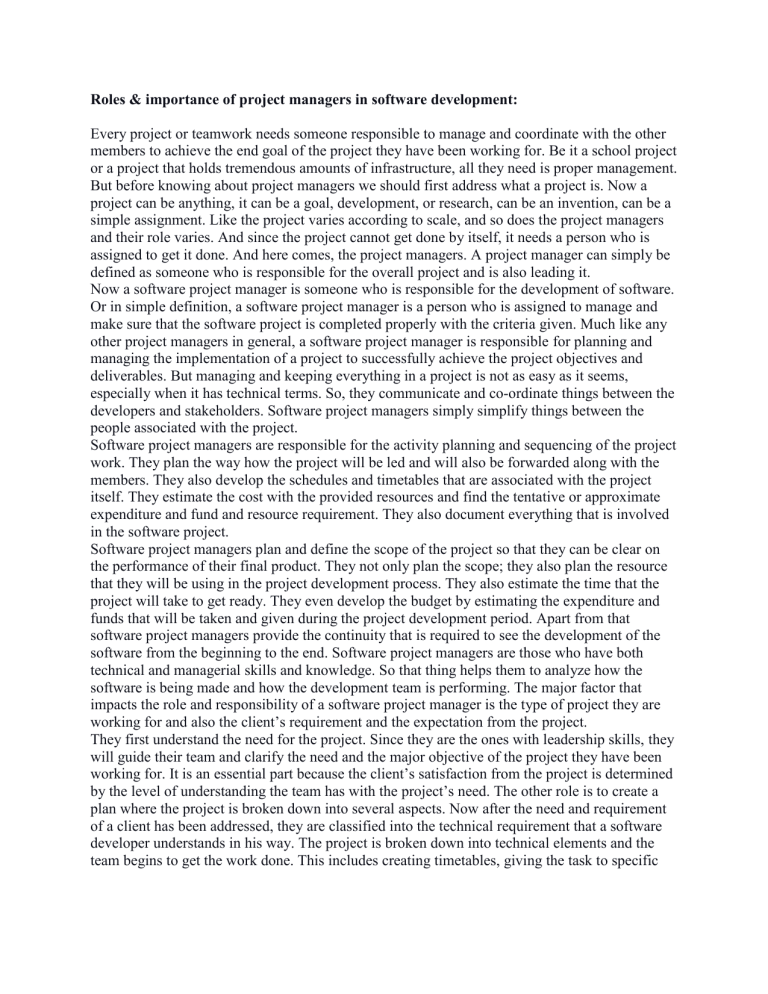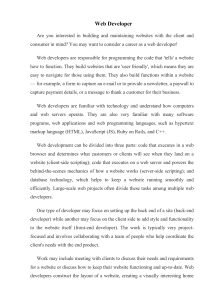
Roles & importance of project managers in software development: Every project or teamwork needs someone responsible to manage and coordinate with the other members to achieve the end goal of the project they have been working for. Be it a school project or a project that holds tremendous amounts of infrastructure, all they need is proper management. But before knowing about project managers we should first address what a project is. Now a project can be anything, it can be a goal, development, or research, can be an invention, can be a simple assignment. Like the project varies according to scale, and so does the project managers and their role varies. And since the project cannot get done by itself, it needs a person who is assigned to get it done. And here comes, the project managers. A project manager can simply be defined as someone who is responsible for the overall project and is also leading it. Now a software project manager is someone who is responsible for the development of software. Or in simple definition, a software project manager is a person who is assigned to manage and make sure that the software project is completed properly with the criteria given. Much like any other project managers in general, a software project manager is responsible for planning and managing the implementation of a project to successfully achieve the project objectives and deliverables. But managing and keeping everything in a project is not as easy as it seems, especially when it has technical terms. So, they communicate and co-ordinate things between the developers and stakeholders. Software project managers simply simplify things between the people associated with the project. Software project managers are responsible for the activity planning and sequencing of the project work. They plan the way how the project will be led and will also be forwarded along with the members. They also develop the schedules and timetables that are associated with the project itself. They estimate the cost with the provided resources and find the tentative or approximate expenditure and fund and resource requirement. They also document everything that is involved in the software project. Software project managers plan and define the scope of the project so that they can be clear on the performance of their final product. They not only plan the scope; they also plan the resource that they will be using in the project development process. They also estimate the time that the project will take to get ready. They even develop the budget by estimating the expenditure and funds that will be taken and given during the project development period. Apart from that software project managers provide the continuity that is required to see the development of the software from the beginning to the end. Software project managers are those who have both technical and managerial skills and knowledge. So that thing helps them to analyze how the software is being made and how the development team is performing. The major factor that impacts the role and responsibility of a software project manager is the type of project they are working for and also the client’s requirement and the expectation from the project. They first understand the need for the project. Since they are the ones with leadership skills, they will guide their team and clarify the need and the major objective of the project they have been working for. It is an essential part because the client’s satisfaction from the project is determined by the level of understanding the team has with the project’s need. The other role is to create a plan where the project is broken down into several aspects. Now after the need and requirement of a client has been addressed, they are classified into the technical requirement that a software developer understands in his way. The project is broken down into technical elements and the team begins to get the work done. This includes creating timetables, giving the task to specific members, and checking the project at every checkpoint. The overall structure to begin work then begins with this process. They now serve as an intermediary between the developers and clients and other stakeholders. Since they have to be consistent throughout the project, they answer the queries and clear the communication barriers between two people from a different or similar background who are the direct or indirect part of the software project. They provide project status report to the stakeholders and communicate with both sides i.e., client’s and developer if the project has any amendments to make. Software project managers are also responsible to make sure the result or the final product matches the need and expectations of the client. So, to do that they run different sets of tests and cross-checks to detect the bugs and errors. They inspect everything thoroughly for the best deliverable quality. So, to gather the response and feedback, they provide the beta version of the software to interested parties. The other important role of a software project manager is resource allocation. The main objective as well as the main motive of the project management team is to develop and deliver the product with the least expenditure, as faster as possible but as better as possible also. So, to see things happen in that way, the software project managers are responsible for the management of the resource that will be needed during the development process. The other role and responsibility of a software project manager are to follow up and check how the final product is performing. Even though if the development process has ended and the final product is delivered to the client, software project managers will have to follow up and see if the final product is going on smoothly. To do that, they document and wrap the project by keeping the user manuals along with the final product. In some cases, they also provide training. And finally, they are responsible to answer any question that is related to the software project. Even though it may seem easy, it is way more complicated. An individual needs to have lots of experience and versatile skills to cope with any uncertain and unwanted changes and challenges that may occur during the development process of particular software.




